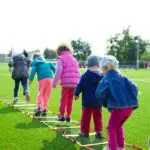Teaching kids about responsibility is a crucial part of their growth and development. It helps them become more accountable for their actions and prepares them for future challenges. Responsibility encompasses many traits, such as reliability, dependability, and accountability. As a parent or caregiver, it is your duty to teach your kids about responsibility, and it’s never too early to start.

Understanding responsibility is the first step in teaching it to your kids. Responsibility means being accountable for your actions and the outcomes that follow. It’s about owning your decisions and being dependable when others rely on you. When kids learn about responsibility, they become more independent and self-reliant, which helps them develop their problem-solving skills and decision-making abilities.
Key Takeaways
- Responsibility is about being accountable for your actions and outcomes.
- Teaching responsibility starts with understanding what it means.
- Teaching responsibility at home and school, developing personal responsibility, and using community tools are all essential in helping kids learn about responsibility.
Understanding Responsibility
Responsibility is an essential life skill that every child should learn. It is the ability to take ownership of one’s actions, obligations, and duties. Teaching kids about responsibility can help them become more independent, reliable, and accountable individuals. In this section, we will discuss the definition and importance of responsibility.
Defining Responsibility
Responsibility is the state of being accountable for one’s actions, obligations, or duties. It is the ability to make decisions and take actions that have consequences and to accept the consequences of those actions. Personal responsibility is an important aspect of responsibility. It means taking ownership of one’s life and making choices that are in line with one’s values and goals.
Importance of Responsibility
Teaching kids about responsibility is crucial for their development. It helps them become more independent and self-reliant individuals. When kids learn to take responsibility for their actions, they become more accountable and reliable. They become better problem-solvers and decision-makers. Responsibility also helps kids develop a sense of pride and self-worth as they see the positive impact of their actions on themselves and others.
In addition to personal development, responsibility is also important for social development. Kids who learn to take responsibility for their actions are more likely to have positive relationships with others. They are more trustworthy and dependable, which makes them better friends, family members, and team players.
Overall, teaching kids about responsibility is an essential part of their development. It helps them become more independent, accountable, and reliable individuals. By understanding the definition and importance of responsibility, you can help your child develop this crucial life skill.
Teaching Responsibility at Home
Teaching responsibility is an essential part of parenting. It is important to instill a sense of responsibility in your child from a young age. This will help them develop into mature and reliable adults. Here are some ways you can teach your child about responsibility at home.
-

Bold Male Pride – Baseball Trucker Cap Celebrating Masculinity
£18.00 Select options This product has multiple variants. The options may be chosen on the product page -

Dad Bod Appreciation Gift Mug
£14.00 Add to cart -

Dad Bod, Bad Jokes Structured Baseball Cap
£22.00 Select options This product has multiple variants. The options may be chosen on the product page
Chores and Tasks
Assigning chores and tasks to your child is an excellent way to teach them about responsibility. It helps them understand the importance of contributing to the household and taking care of their belongings. Make sure you assign age-appropriate tasks and explain why it is important for them to complete them. You can use a chore chart to keep track of their progress and reward them for their efforts.
Money and Allowance
Giving your child an allowance is a great way to teach them about money management and responsibility. You can assign them tasks or chores and pay them accordingly. This will help them understand the value of money and how to save for things they want. It is important to set clear rules and expectations for how the allowance will be earned and spent.
Pet Care
Taking care of a pet is a big responsibility. If you have a pet at home, involve your child in its care. Assign them tasks such as feeding, walking, and cleaning up after the pet. This will teach them about the importance of caring for living things and being responsible for their well-being.
Overall, teaching responsibility at home is an ongoing process. It requires patience, consistency, and positive reinforcement. By teaching your child about responsibility, you are setting them up for success in all areas of their life.
Teaching Responsibility at School
As a teacher, you have a great opportunity to teach your students about responsibility. Here are some ways you can teach responsibility at school:
Homework and Assignments
One of the most important ways to teach responsibility is by assigning homework and other tasks. By giving students homework and assignments, you are teaching them to be responsible for their own learning. Make sure to give clear instructions and deadlines, and encourage your students to ask for help if they need it.
To help your students stay organized, consider providing them with a homework planner or agenda book. This can help them keep track of their assignments and due dates. You can also encourage them to use a checklist or other organizational tool to help them stay on top of their work.
Group Projects and Teamwork
Another great way to teach responsibility is by assigning group projects and encouraging teamwork. When working on a group project, students must learn to work together and communicate effectively. This can help them develop important skills such as leadership, problem-solving, and collaboration.
To help your students develop these skills, consider assigning group projects that require them to work together to achieve a common goal. Provide clear instructions and guidelines, and encourage your students to take ownership of their roles and responsibilities within the group.
By teaching responsibility at school, you are helping your students develop important life skills that will serve them well in the future. Remember to be patient and encouraging and to provide plenty of opportunities for your students to practice and develop their skills.
Developing Personal Responsibility
Teaching kids about personal responsibility is crucial in helping them grow into responsible adults. Developing personal responsibility involves instilling a sense of self-esteem, independence, and decision-making skills in children. Here are some sub-sections that can help you teach your child about personal responsibility:
Self-Esteem and Pride
Self-esteem is an essential component of personal responsibility. Children with high self-esteem are more likely to take responsibility for their actions and obligations. Encourage your child to take pride in their accomplishments, no matter how small. Celebrate their successes and help them learn from their mistakes. By doing so, you can help your child develop a positive self-image and take responsibility for their actions.
Independence and Autonomy
Teaching children to be independent and autonomous is another critical aspect of personal responsibility. Encourage your child to take on age-appropriate tasks, such as making their bed, doing their laundry, and preparing simple meals. By doing so, you can help them develop a sense of independence and autonomy, which can help them take responsibility for their actions and decisions.
Decision Making
Teaching children how to make decisions is another essential aspect of personal responsibility. Encourage your child to make their own choices, such as what clothes to wear or what activities to participate in. Help them understand the consequences of their decisions and encourage them to take responsibility for their actions. By doing so, you can help them develop decision-making skills and take responsibility for their choices.
In conclusion, teaching children about personal responsibility is crucial in helping them grow into responsible adults. By instilling a sense of self-esteem, independence, and decision-making skills in children, you can help them take responsibility for their actions and obligations.
Role of Parents in Teaching Responsibility
As a parent, you play a crucial role in teaching your children about responsibility. Here are some ways you can help your child develop a sense of responsibility:
Modeling Responsible Behavior
Children learn by example, so it’s important to model responsible behavior. Show your child how to take responsibility for their actions, and they’ll be more likely to do the same. For example, if you make a mistake, admit it and take steps to correct it. If you promise to do something, follow through on your commitment. By modeling responsible behavior, you’re setting a positive example for your child to follow.
Providing Guidance and Feedback
Your child needs guidance and feedback to learn how to be responsible. Give them clear instructions on what you expect them to do, and provide feedback on how well they’re doing. For example, if you ask your child to clean their room, give them specific instructions on what you want them to do. Then, check their progress and give them feedback on how well they’re doing. Be sure to praise them for their efforts and offer suggestions for improvement if necessary.
Discipline and Consequences
Discipline and consequences are important tools for teaching responsibility. If your child doesn’t follow through on their responsibilities, there should be consequences. For example, if your child doesn’t clean their room, they might lose their screen time privileges for the day. It’s important to be consistent with your discipline and consequences so your child knows what to expect.
Trust and Support
Trust and support are essential for teaching responsibility. Your child needs to know that you trust them to be responsible and that you’re there to support them if they need help. Give your child opportunities to take on responsibilities, and be there to offer guidance and support if they need it. By trusting and supporting your child, you’re helping them develop the skills they need to be responsible and independent.
Remember, teaching responsibility is an ongoing process. It takes time and effort, but the rewards are worth it. By modeling responsible behavior, providing guidance and feedback, using discipline and consequences, and offering trust and support, you can help your child develop a strong sense of responsibility that will serve them well throughout their life.
Community and Responsibility
Teaching kids about responsibility involves helping them understand how their actions affect the world around them. One way to do this is by introducing them to the concept of community and how it relates to responsibility.
Volunteering and Helping Others
Volunteering is a great way to teach kids about responsibility and the importance of giving back to their community. Encourage your child to find a cause they are passionate about and get involved. This could be anything from helping out at a local animal shelter to participating in a beach clean-up.
Volunteering also teaches kids valuable skills such as teamwork, communication, and problem-solving. It helps them develop empathy and compassion for others and builds their self-esteem.
Leadership Skills
Teaching kids about leadership skills is another way to help them understand the importance of responsibility. Encourage your child to take on leadership roles in their community, such as organizing a fundraiser or leading a project.
Leadership skills involve being able to communicate effectively, set goals, and motivate others. By teaching your child these skills, you are helping them develop a sense of responsibility and empowering them to make a positive impact on their community.
In conclusion, teaching kids about responsibility through community involvement is a great way to help them understand the impact of their actions on the world around them. Encouraging them to volunteer and take on leadership roles will not only benefit their community but also help them develop valuable skills that will serve them well throughout their lives.
Tools to Teach Responsibility
Teaching responsibility to kids is a crucial part of their development. It helps them become independent and accountable for their actions. Fortunately, there are various tools available that can help you teach responsibility to your kids in a fun and engaging way. Here are some of the most effective tools:
Responsibility Charts
Responsibility charts are a great way to track your child’s progress and motivate them to take responsibility for their actions. These charts are simple and easy to use. You can create a chart that lists the tasks your child needs to complete, such as making their bed, doing their homework, or cleaning up their toys. Each time your child completes a task, they can mark it off on the chart. This helps them see their progress and feel a sense of accomplishment.
Worksheets and Activities
Worksheets and activities are another great tool for teaching responsibility. There are many free worksheets and activities available online that can help your child learn about responsibility. These worksheets and activities can be tailored to your child’s age and interests. For example, you can find worksheets that teach kids about the importance of taking care of their pets or activities that encourage kids to help out around the house.
One fun activity to try is the “Money Game”. Give your child a set amount of money and help them budget it. This helps develop personal responsibility at an early age and teaches them to make good choices with finances. If you are looking for a classic game to go along with this, Monopoly or Monopoly Jr are fun ways to teach responsible actions to kids.
In conclusion, teaching responsibility to kids is an important part of their development. By using tools like responsibility charts, worksheets, and activities, you can make the learning process fun and engaging for your child. With a little effort and patience, you can help your child become more independent and accountable for their actions.
Conclusion
Teaching kids about responsibility is an important part of their development. By instilling this value in them from an early age, you can help them become responsible and successful adults. When you teach your kids about responsibility, you are helping them learn how to contribute to society and find joy in their accomplishments.
One of the best ways to teach kids about responsibility is by setting a good example yourself. When your kids see you taking responsibility for your actions, they are more likely to follow your lead. You can also encourage responsibility by assigning age-appropriate tasks and chores. This helps your kids learn how to manage their time and take care of their belongings.
Another important aspect of teaching kids about responsibility is helping them understand the values of commitment and accountability. When you make commitments, you are showing your kids that you are responsible and trustworthy. You can also help your kids understand the importance of accountability by providing clear consequences for their actions.
In conclusion, teaching kids about responsibility is an ongoing process that requires patience and dedication. By setting a good example, assigning age-appropriate tasks, and helping your kids understand the values of commitment and accountability, you can help them become responsible and successful adults.






